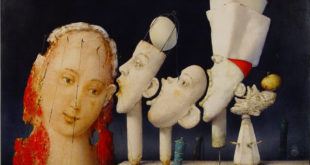 Exhorted by comrades with whom we have shared actions in the last years with precarious and migrants, we contribute here to the debate launched by Communianet.org on the usefulness, topicality and need to refer to the class. Obviously, the aim of this reflection is especially to inquire on and investigate the lexicon with which the movement has related to a political concept that in the communist tradition has long been dominant and indisputable. We are grateful for this invitation to debate because it allowed us to reflect on and around a concept that in all these years we have persisted in using.
Exhorted by comrades with whom we have shared actions in the last years with precarious and migrants, we contribute here to the debate launched by Communianet.org on the usefulness, topicality and need to refer to the class. Obviously, the aim of this reflection is especially to inquire on and investigate the lexicon with which the movement has related to a political concept that in the communist tradition has long been dominant and indisputable. We are grateful for this invitation to debate because it allowed us to reflect on and around a concept that in all these years we have persisted in using.
***
What follows is a contribution to the recent debate about the problem of rethinking class today. If the common need is to articulate and organize a «partisan politics», what is at stake is the possibility to clearly define this «part», especially in the light of the transformations of class struggle in front of the processes of globalization, the challenge posed by the crisis and the recent changes in the political lexicon of the movement.
Rather than getting stuck in desperate attempts of a conceptual redefinition, we underline more basically some of the symptoms of this problem. To think in terms of class make sense only if we think that struggles, still developing inside capitalism, can find a common and productive political reference point. The discourse of the class cannot be the mere description of masses of labour relations and of their daily forms of domination, but it has to identify a specific way to break these relations.
Class is not a part of the society, but the combination of subjective behaviours which contest the relations of domination constituting the class itself. Nevertheless, we know that not all of these behaviours are able to determine practices and forms of protest which can be described in terms of class. The paradox of class lies inside the reality from which it comes and from which it has necessarily to emancipate itself.
The fierce reality of the first global capitalistic crisis and of the generalized affirmation of the processes of precarization of contemporary labour have brought to light the polarization that crosses the entirety global spaces. This polarization – recognized for example by the experiences of #Occupy that attempted to express the claims of the 99% against the 1% of the owners of global wealth – has brought back a lexicon of class which was abandoned in the early 2000s by the global movement of protest against capitalistic globalization.
In the «dictionary» of the experiences of protest introduced by the mobilization of Seattle and Genoa the «movement of movements» and the «multitude» took the place of the class, considered at the time insufficient to describe the new dynamics of accumulation and exploitation as well as the new forms of subtraction, escape and politicization against the capitalistic order. This neglect of class discourse described the position of the subjects of those protests, hardly ascribable to the same social and working condition. Moreover, this neglect was the symptom of the difficulty – or the incapacity – to intercept labour conflict, delegated to the union as its official representative. The best that the «movement of movements» could do was to attend union events, creating some kind of dialogue, but thoroughly convinced at the same time of being something different. The enemy was identified with the institutional representatives of political power, often all together in big summits, while the daily master remained in the background, as hidden as the class relations that allowed him to be what he was.
The lexicon of the global movement, however, also indicated the need to give expression to the multiplicity of the subjects of antagonism: the «movement of movements» had to be able to include – at least nominally – requests like those women were expressing, already long unwilling to be reduced or relegated to being a “secondary” contradiction. The «multitude» demanded that it overtake the labour connotation of the «class», considered a residual of the fordist past to be left behind in a world characterized by widespread social cooperation, also outside the factory and thus no more directly organized by its discipline. The nexus between proletariat and working class was therefore rejected, with the demand to «generalize» the conflict between capital and labour tracing it in every form of antagonism, since life itself was by this time entirely valorized.
At the same time, however, that same discourse reproduced the logic that meant to criticize the making of the «cognitariat» – considered the highest expression of social cooperation – the general subject, able to lead the struggles, taking the place of a by then obsolete labour subject.
This notwithstanding, the reference to the multitude still poses an important political question, in relation to the impossibility of considering the «class» as an internally homogeneous part.As the working class of the communist movement was the indication of a political subjectivity and not only the combination of a social position with a productive role, so affirming that the multitude is the political form of the class means recognizing that the contemporary generalizations of precarity, and the process of proletarization which follows it, do not immediately correspond to a recomposition of positions in the conflict between capital and labour. Rather, that generalization, as the proletarization of the middle social class and the huge masses of migrants, leaves open more than ever the question of how those positions can produce antagonistic behaviours and practices able to affect the relation of capital, acquiring a mass dimension.
If the class is not a «thing», but it is defined inside a struggle, it cannot be identified entirely from the point of view position in work the force, while on the other hand antagonism cannot be independent from the position of individuals inside the relation of capital. Class struggle is not a conditioned response, but neither simply an act of will. What we are witnessing is therefore a paradoxical, but not new, disconnection between proletariat and class, if we don’t want to give the last term a purely sociological characterization, but instead we want to consider it as a useful tool to define a political practice capable of choosing on which side be.
On the other hand i the difficulty to consolidate stable models of communication among the various subjects of contemporary labour is typical of our global condition, whose organization is marked by mobility. Spatial mobility of migrant labour, mobility imposed by the crisis and by the new paradigm of employability, mobility of «youth» behaviours in relation to permanent employment and mobility of contractual forms are all phenomena which describe the current impossibility to place the class in a somehow identifying and indicative image or imaginary. This mobility not only makes the «external» borders of the class evanescent, but also imposes us to rethink its internal differentiation, decomposition and individualization. This mobility continuously puts under its thumb any process of recomposition and furthermore it appears to«negatively» burden on the levels of conflict in the work place, because, in China as in Italy, in front of the difficulty of improving our condition through struggle, the common practice is to leave, searching for other employments which correspond to other subordinations.
Nevertheless from these behaviours and these dynamics we have to start and try to politically state the meaning of «class» today. They don’t show an acceptance of the new capitalistic order of mobility, but on the contrary they indicate the presence of forms of subtraction to the web of its social, productive and legal relations. These behaviours and those dynamics express the attempt to resist the process of individualization at the base of the social relation of capital. It is worthwhile to deal with this individualization a moment, because it constitutes the sign of a general transformation of society, no longer recognizable as a national formation and neither thus as a space of ties guaranteed through the mediation of the sovereignty of the single State. This does not correspond to the end of the capitalistic social relation, but to a radical disconnection of its parts deploying on a global scale and preventing the identification of specific labour subjects – workers or cognitarian – around which it would be possible to rethink the class and its recomposition. The answer to this individualization is by now a revival of mutualismthat, in social centers, in squatted houses, in solidarity networks, in independent trade unionism and single struggles tries to offer the local (and reassuring) answer to a global and almost elusive condition.
This disconnection experienced daily by precarious, workers, migrants and poor in search of salary or for income shows however the need and the possibility of a collective action – not local and not limited to forms of socialization – against the hierarchy that wishes to legitimize these processes of detachment and individualization as natural facts. The mission we have to face is to connect these separate existences without expecting to represent them as an undifferentiated unity. It’s not to force them all on a equal level inside an imagined class, but to open processes of organization and political communication that, starting from fragmented and limited experiences and practices, would impose the taking of a stance.
 ∫connessioniprecarie connettere gli ∫connessi, produrre comunicazione
∫connessioniprecarie connettere gli ∫connessi, produrre comunicazione




